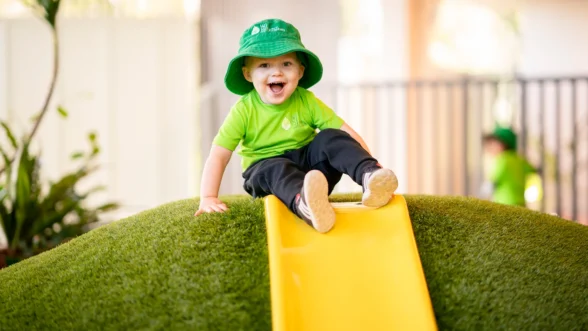
Education, Wellbeing
Useful tools, Wellbeing
21 April, 2026

A temper tantrum is every parent’s nightmare. Those angelic little voices can turn into mighty screams once they get worked up. Then it can sometimes be hard for little ones to calm down. If it happens out in public and everyone’s staring at you both, you may feel pressured to make the noise stop. But don’t sweat it. Temper tantrums are inevitable and the most important thing is to keep calm and support your child through it.
We get it, staying calm is much easier said than done. Take a deep breath and count to 10. Or count to 20 if it’s been one of those days. Keep an eye on your child, but don’t rush into their space. Having a good mindset can help you keep your cool in this situation. Have empathy for your screaming little munchkin. Remember, if they’ve worked themselves into this state, they’re at the end of their tether and probably feel pretty bad too.
While onlookers may just want quiet, it’s more important to make sure your child is safe and their behaviour isn’t hurting anyone else. Make sure there’s no food in their mouth they could choke on and that there’s nothing nearby that’s going to hurt them if they’re thrashing about. If your child is hitting or kicking someone, scoop them up and hold them or put them in a safe place until they calm down.
Once the tantrum has subsided, it’s important to provide children with empathy and comfort. Tantrums take a lot of energy and they’re likely to feel physically and emotionally spent. Don’t give into their demands, but do give them a hug and show them that you love them. With any luck, they’ll be ready for a snack and a nap, so you can both recover!
It’s helpful to understand why tantrums occur. In younger children it’s often because they’re overwhelmed with emotions. For example, they’re tired and hungry and don’t understand why they can’t have the toy they want. Older children may have trouble expressing how they’re feeling. Talking together or reading books about feelings can help children to recognise when they’re feeling tired, hungry, sad or angry, which is the first step in addressing those feelings. For children who are still learning to talk, it may be helpful to come up with a hand gesture or facial expression so they can tell you how they’re feeling. Talk about appropriate ways to respond to various situations that may trigger tantrums and try to model that behaviour too.
Take comfort in the knowledge that this phase will pass. Tantrums are a developmental stage that most children grow out of on their own. They become less frequent as children develop self-control and begin to regulate their emotions. However, it is worth talking to your child’s doctor if your child is causing harm to themselves or others during tantrums, or if they’re holding their breath to the point of almost fainting. Tantrums that continue to worsen after turning four years old should also be mentioned to your doctor.